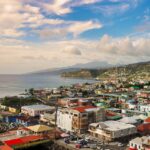Why retire in Portugal?
According to our Global Intelligence Unit’s US Retirement Trend report, Portugal ranks as the world’s second-best country for retirement due to its balance of lifestyle perks, affordability, and favorable legal frameworks for foreign retirees.
Here are some of the benefits:
Benefits of Retiring in Portugal
Fantastic weather: Portugal’s Mediterranean climate offers mild winters and long, sunny summers.
Warm and welcoming people: The Portuguese are known for their hospitality, making it easy for expats to feel at home.
Relaxed lifestyle: Life in Portugal flows at a slower, more laid-back pace.
Thriving culture: From traditional Fado music to historic architecture and world-class cuisine, Portugal offers rich cultural experiences.
Lower cost of living: Compared to other European nations, Portugal is more affordable, with everyday expenses like food, transportation, and healthcare costing significantly less.
Affordable real estate: Property prices in Portugal, particularly in regions like the Algarve or central Portugal, are lower than in many Western European countries.
Who can retire in Portugal?
 EU/EEA Citizens
EU/EEA Citizens
Citizens of the European Union (EU), European Economic Area (EEA) countries, and the European Free Trade Association (EFTA) nations have the right to live and retire in Portugal without the need for a visa. They can enjoy the same rights as Portuguese citizens in terms of residency.
 Non-EU Citizens
Non-EU Citizens
Non-EU citizens, including retirees from the United States, Canadian citizens, and other non-European countries, can retire in Portugal. However, they typically must apply for a long-term visa or residence permit. Portugal offers different types of visas, such as the D7 visa for retirees, which is designed for individuals with regular income, such as pensions, to support themselves in Portugal.
How to retire in Portugal?
Any non-EU citizen can retire in Portugal, but they must apply for a long-term residence visa. This includes people who want to retire to Portugal from UK, as it’s no longer part of the EU. Both options allow retirees to call Portugal home, provided they meet the requirements and can provide the following documentation:
- A valid passport
- Proof of your regular income
- Health insurance coverage
- Additional documents based on your chosen residency route
- A criminal background check was submitted to the Portuguese authorities
 D7 Visa (Portugal Retirement Visa)
D7 Visa (Portugal Retirement Visa)
The Portugal Retirement Visa, commonly called the Portugal D7 Visa or Passive Income Visa, allows retirees to use passive income to cover their living expenses. This income must be equivalent or more to the Portuguese minimum wage of €870.00 per month. The source of the passive income can stem from social security benefits (pension income), rental income, transferable equity, real estate or financial investments.
 Portugal Golden Visa
Portugal Golden Visa
The Portugal Golden Visa provides another pathway for retirees from non-EU countries. Several attractive investment options are available for the Golden Visa. The most popular routes are investing in a qualified Portugal Golden Visa investment fund, creating the required minimum Portuguese employment opportunities, or donating to Portugal’s artistic and cultural projects.
Portugal Golden Visas grant applicants and their family members the right to live in the country and benefit from Portugal’s healthcare system, spectacular weather, and highly-ranked educational system.
Portuguese citizenship for retirees
After acquiring the retirement visa for Portugal, applicants can receive a temporary residence permit, which allows them to live legally in the country. After five years, the retiree can apply for permanent residency in Portugal and possibly acquire Portuguese citizenship, provided the requirements are met, as set under Portuguese nationality law.
As an EU citizen, you will have access to free movement across the European Union and the right to live, work, and study in any of the EU member states.
How To Retire in Portugal From The USA
Americans moving to Portugal permanently should follow the necessary immigration procedures. A US citizen can enter Portugal without a visa and stay for up to 90 days. However, if they wish to remain for longer than 90 days, they must obtain a temporary residence permit through various visa options, including the Portugal Golden Visa.
Other pathways to obtain residency include securing employment, enrolling in a long-term course, or marrying a Portuguese citizen. A US citizen can apply for Portuguese citizenship after five consecutive years of temporary legal residency. This route allows for dual citizenship, making it an attractive option for many Americans seeking a new life in a safe country.
Either way, retiring in Portugal from the US involves several key steps, including obtaining the right visa, meeting residency requirements, and considering tax and healthcare implications.
How To Retire To Portugal From The UK
Moving to Portugal from the UK is increasingly appealing to British citizens, particularly after Brexit. With various visa options for retirees, Portugal offers a legal pathway to live in Europe.
Although British expats can no longer simply pack up their belongings and move to Portugal, there are several temporary stay visa options that are relatively straightforward. Once you obtain your NIF (Número de Identificação Fiscal), open a bank account, and secure suitable accommodation in Portugal, you can begin exploring the options for Portuguese residence permits and visas. You will need to apply through a Portuguese consulate.
The favorable visa options, a lower cost of living, and an inviting Mediterranean climate make retirement in Portugal a compelling choice for UK citizens looking for a fulfilling retirement experience.
What You Need To Know Before Retiring in Portugal
Portugal’s living costs for retirees
Portugal is one of the most affordable countries in Europe. The cost of living is significantly lower than in many Western European countries and the US, making it an attractive choice for both expats and retirees.
Product | Portugal | United States |
Milk (regular), (1 liter) | €0.81 | €0.95 |
Loaf of Fresh White Bread (500g) | €1.23 | €3.23 |
A Dozen Eggs (regular) (12) | €2.32 | €4.60 |
Apples (1kg) | €1.87 | €4.47 |
Chicken Fillets (1kg) | €6.00 | €10.97 |
Beef Round (1kg) (or Equivalent Back Leg Red Meat) | €9.75 | €13.88 |
Local Cheese (1kg) | €8.12 | €10.48 |
Domestic Beer (0.5-liter bottle) | €1.09 | €2.48 |
Bottle of Wine (Mid-Range) | €4.00 | €11.94 |
The cost of living in Portugal compared to the US is 39.2% lower, and rent is 54.2% lower than in the US. Similarly, compared to the UK, living expenses in Portugal are about 35% lower, and rent is nearly 40% less.
Portugal | United Kingdom | |
Utilities (monthly) | €114.74 | €284.43 |
3-Bed apartment in city center | €1,599.51 | €2,050.19 |
Mobile phone monthly plan | €18.94 | €15.07 |
White bread | €1.36 | €1.47 |
Milk (1 liter) | €0.94 | €1.46 |
Eggs (12) | €2.68 | €3.50 |
Average monthly net salary | €1,043.25 | €2,872.04 |
Healthcare for retirees
Healthcare in Portugal is primarily provided through the publicly funded National Health Service (the Serviço Nacional de Saúde, or SNS), which offers essential health services to residents. While this system provides affordable care for Portuguese citizens and legal residents, it does not completely cover all medical needs, and some fees may apply for certain treatments or procedures.
Although Portugal’s public health care is generally of high quality, those accustomed to private health care may find differences in service levels. Obtaining private health insurance is necessary for residents to secure a residency visa. Once residency is established, individuals can keep their private coverage for additional benefits.
Health insurance for foreigners is available at a low cost. Monthly premiums typically range from €20 to €50, depending on the coverage needed. You could spend between €400 a year for a basic plan and around €1,000 annually for more comprehensive medical services.
While the Portuguese healthcare system offers a solid public health system, private health insurance is an important option for those seeking a broader range of services and quicker access to care.
Portugal’s inheritance law and wills
Understanding and learning how to navigate and possibly avoid Portuguese inheritance tax is essential for anyone considering retiring in Portugal. This tax applies to the transfer of property and assets after a person’s death, and the rate can vary depending on the deceased’s country. In Portugal, the tax is determined by the deceased’s home nation. If no will is in place, your estate will be managed according to the inheritance laws of that country.
For tangible assets, such as property, the inheritance tax is calculated based on the value of the assets transferred. In the case of cash inheritances, the tax is a percentage of the total amount received.
For retirees seeking to navigate these laws, it’s advisable to consult legal experts familiar with the regulations imposed by the Portuguese government. This will help ensure your wishes are honored and your estate is managed according to your preferences.
Buying property in Portugal
Buying property in Portugal is an appealing option for many. The country’s diverse and stable real estate market has attracted foreign investors recently. This interest has increased property prices, but Portugal’s real estate is still more affordable than in many other EU countries.
You can find various properties, including traditional houses, modern apartments, and even old buildings or barns that need renovations.
Generally, homes in larger cities like Lisbon and Porto are more expensive than in areas like the Silver Coast or central Portugal. If you’re considering retirement in Lisbon, be prepared for the capital’s higher prices, but exploring neighborhoods outside the city center might help you find better deals.
You’ll need to acquire a tax identification number in Portugal to purchase property. This is necessary for all financial transactions, including buying a home. It’s also a good idea to open a Portuguese bank account, as having a local bank account can help you avoid extra fees.
Ensure you know the associated taxes when buying property, such as IMT tax, IMI, and Stamp Duty Tax. Understanding these costs is important for managing your budget, especially for Portuguese residents planning their retirement years and having to deal with Portugal property transfer tax.
What is the best place to retire in Portugal?
1. Lisbon
Lisbon, the capital city, is renowned for its vibrant culture, historic architecture, and diverse activities. With a mild climate, excellent healthcare facilities, and a relatively low cost of living compared to other Western European countries, it’s an appealing choice for many.
This lively city attracts retirees who enjoy an active lifestyle and want to be close to the energy of daily life. Living in Lisbon means endless opportunities for entertainment and exploration, making it one of the best places to live in Portugal.
2. Porto
Porto, Portugal’s second-largest city, is considered one of the best cities for expats. Famous for its picturesque riverside and historic wine cellars, it offers a charming atmosphere. Retirees here can enjoy a slower pace of life while still having access to cultural experiences and lower living costs than many other European cities.
Situated in the Douro Valley, one of the oldest wine regions in the world, Porto allows retirees to spend weekends wine-tasting in local vineyards or taking scenic cruises along the river.
3. Cascais
Nestled on the Portuguese Riviera, Cascais is a coastal town celebrated for its stunning beaches, well-kept parks, and upscale lifestyle. This relaxed environment offers outdoor activities and easy access to Lisbon, making it perfect for those who want tranquility and city life.
Cascais is known for its luxurious properties, catering to expats seeking comfort and elegance. For more details, check out our article on buying property in Cascais.
4. Faro
As the capital of the Algarve region, Faro offers a peaceful and laid-back lifestyle. The Algarve is famous for its beautiful beaches, golf courses, and warm climate. Faro features a historic Old Town, providing cultural experiences, while the region as a whole is perfect for outdoor activities.
The Algarve is regarded as one of the best places to retire in Portugal, thanks to its stunning beaches and endless sunshine. Retirees with a large English-speaking community find plenty of support for navigating the Portuguese retirement process.
5. The Silver Coast
For those seeking a less developed and more authentic experience, the Silver Coast in the central region of Portugal is ideal. Here, you’ll discover tranquil areas surrounded by nature.
Retirees on the Silver Coast can choose from historic towns with cobblestone streets to beachfront communities that promote a laid-back lifestyle. This region’s mix of culture, natural beauty, and affordability make it an attractive option for retiring in Portugal.
If you’re considering retiring in Portugal from the USA, you’ll join many fellow American expats who have embraced the beauty of this country. Many US expats live in Lisbon, Porto, and the Algarve, enjoying sun-soaked beaches, vibrant cities, and breathtaking landscapes. Additionally, Portugal has a UNESCO World Heritage Site prevalence, with another 19 on the tentative list, making it a rich place to explore.
Taxes For Retirees in Portugal
As a tax resident in Portugal, you must declare your worldwide income yearly and pay income tax on it.
American citizens should be aware that they may face double taxation due to the tax regulations in the USA. However, some countries have tax treaties that can help alleviate this burden. For effective financial planning and to manage your tax affairs, including any potential exceptions you might qualify for, it’s advisable to consult with tax specialists.
Portugal has many expats who may be concerned about double taxation. To avoid this, it’s important to obtain a tax identification number (NIF) and understand the double tax treaties Portugal has with other countries.
These treaties help prevent double taxation on the same income in both Portugal and your home country.
Tips for Retiring in Portugal in 2025
Plan your budget: Start planning your budget to maximize your retirement savings. Consider costs such as rent deposits, moving expenses, legal fees for visa applications, and setting up your new home. You may need to purchase furniture and appliances, so explore new and second-hand options to manage costs effectively. Don’t forget to include expenses for essential services like phone, internet, cable, and utilities. Comparing service providers can help you find the most cost-effective options.
Hire an immigration lawyer: Consider hiring a Portuguese immigration lawyer to guide you through the residency process. They can assist with paperwork, ensure you comply with regulations, and provide valuable advice on the legal aspects of your move.
Private health insurance: While Portugal has a public healthcare system, having private health insurance can offer additional coverage and faster access to medical services. Take the time to evaluate different plans to find one that fits your needs and budget.
Learn the local language: Although many Portuguese residents speak English, especially in urban areas, learning the local language can enhance your daily interactions and help you integrate into the community. This effort will make your retirement experience more immersive and enjoyable.
Understand tax implications: It’s essential to familiarize yourself with the tax implications of retiring in Portugal, both from your home country and in Portugal itself. Consulting with tax professionals can help you optimize your financial situation and ensure compliance with all regulations.
Embrace the local lifestyle: Finally, immerse yourself in the local lifestyle by participating in cultural events and exploring Portugal’s rich traditions. Engaging with your new community will enhance your retirement experience and foster a sense of belonging.
Why choose Global Citizen Solutions for your Immigration Visa?
GLOBAL APPROACH BY LOCAL EXPERTS
- GCS has offices located across Portugal.
- Members of the US-Portugal and UK-Portugal Chambers of Commerce in Portugal, and the Investment Migration Council (IMC).
- Our expert team can help you throughout your journey to secure your Visa.
100% APPROVAL RATE
- Our successful track record in applications provides reassurance to applicants.
- We have helped clients from more than 35 countries secure residency in Portugal.
ALL-ENCOMPASSING SOLUTION
- With a single channel of communication, our approach ensures that you have complete clarity on your application.
- Our BeGlobal® Onboarding System allows for a total flow of information.
TRANSPARENCY AND PRIVACY
- Our pricing is clear and detailed, you will not face any hidden costs.
- All data is stored within a GDPR-compliant database on a secure SSL-encrypted server.
Frequently Asked Questions about Retiring in Portugal
What is the retirement age in Portugal?
The retirement age in Portugal is 66 years and 7 months for both women and men. However, there is no official retirement age if you want to apply for a retirement visa, as long as you are over 18 years.
How can I retire to Portugal from the USA?
Apply for residency to retire in Portugal as an American via the D7 Passive Income/Retirement Visa or the Portugal Golden Visa. The process is straightforward but time-consuming.
Essential documents include your passport, proof of income, healthcare services coverage, and a clean criminal background check from your home country.
Can you retire in Portugal from Canada?
Yes, Canadians can retire in Portugal by securing a residence permit through the D7 Visa or Golden Visa program. If you’re interested in the Portugal Golden Visa, you can consult our article: Portugal Golden Visa for Canadians. As an EU citizen, it’s easier to navigate the process compared to non-EU citizens.
Can you retire in Portugal from the UK?
Yes, retirees from non-EU countries can move to Portugal by obtaining a retirement visa. The D7 Visa is a popular option, but the Golden Visa is available for those making significant investments.
Can you retire in Portugal from Australia?
Yes, Australians can retire in Portugal by securing residency, which is straightforward with the Portugal Golden Visa or D7 Visa. For more information, see our article: Portugal Golden Visa for Australians. Non-EU citizens like Australians will need to ensure they meet the specific residency requirements.
How to retire to Portugal as a foreigner?
Foreigners can retire to Portugal by applying for the D7 Visa or the Portugal Golden Visa. The process involves gathering required documents, securing a residency visa, and ensuring you have healthcare services coverage.
What is the cost of living in Portugal for retirees?
The cost of living in Portugal is reasonable compared to other European countries or your home country. You can live comfortably on €1,300-€1,700 per month, depending on the location and whether you need to pay for private healthcare services. This makes it a low cost option for many retirees.
Where is the best place to retire in Portugal?
Portugal offers various options, from major cities like Lisbon or Porto to beachside villas in the Algarve. Your choice depends on your interests, with prices generally lower outside city centers. EU citizens might find it easier to settle into these communities due to existing agreements.
What are the pros and cons of retiring to Portugal?
Pros include warm weather, affordable living, free healthcare services, and a high quality of life. Cons include slow bureaucracy, cold winters in some homes due to the lack of central heating, and the need for Portuguese language skills in remote areas.
Do I need to speak Portuguese when retiring in Portugal?
While it’s not mandatory to speak Portuguese, learning the language will enhance your daily interactions, especially in smaller towns. English is widely spoken in major cities, but knowing Portuguese can help you integrate better in this European destination.
How is the healthcare system in Portugal?
Portugal’s healthcare system is of high quality and accessible to residents, including EU citizens. The National Health Service provides essential care for basic health needs, and costs are generally lower compared to other EU countries.
Both public and private healthcare options are available, giving you flexibility. Having health insurance can help cover additional services and manage your expenses more effectively.
Are there family reunification benefits to retiring in Portugal?
Yes, retiring in Portugal allows for family reunification benefits. As an EU citizen or resident, you can bring close family members to live with you in Portugal. This process is relatively straightforward, making Portugal a welcoming European destination for families.
What are the social security benefits when retiring in Portugal?
Retirees in Portugal can access social security benefits, which include a contribution-based state pension. To maximize benefits, it’s important to consult a financial advisor and ensure you meet all requirements.
If you reside in Portugal, you may need to pay taxes on your pension income. As a resident in the Schengen area, you also enjoy visa-free travel across EU countries.
Why is retiring in Portugal such a popular option for foreigners?
It’s no secret that retiring in Portugal offers a low cost of living, affordable real estate, a good healthcare system, warm climate and friendly locals. No surprise then that it’s highly popular among retirees, and relatively affordable at the moment – and that some experts are expecting prices to rise.
What are the most important considerations for foreigners retiring in Portugal?
Foreign retirees should obtain a residence permit, often through the D7 visa, and understand the visa process. Consider healthcare costs and secure health insurance, as public healthcare may not cover everything.
Be aware that Portugal taxes worldwide income, so consulting a tax advisor is important. Finally, evaluate housing costs, whether renting or purchasing, in your chosen area.
Are there any downsides to retiring in Portugal?
Living in Portugal offers many advantages, but there are also a few downsides to consider. Some of the drawbacks include bureaucratic processes, low-quality housing, a lack of customer service culture, challenges in integrating into Portuguese culture, low wages, and the rising cost of property.

 Gizane Campos
Gizane Campos  Portugal is a highly appealing option for pensioners who retire all the time due to its affordable cost of living, pleasant climate, and high-quality healthcare services.
Portugal is a highly appealing option for pensioners who retire all the time due to its affordable cost of living, pleasant climate, and high-quality healthcare services.



